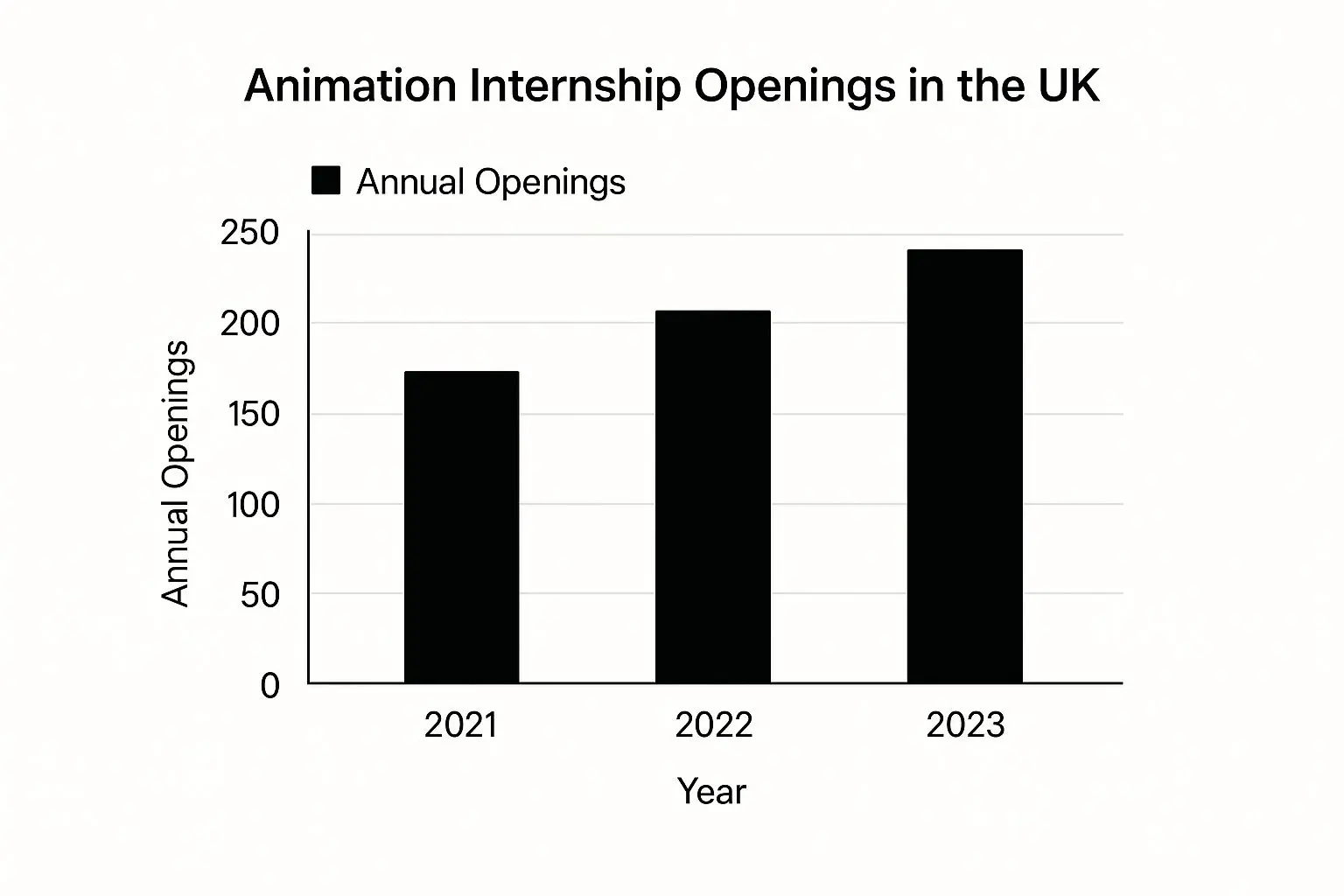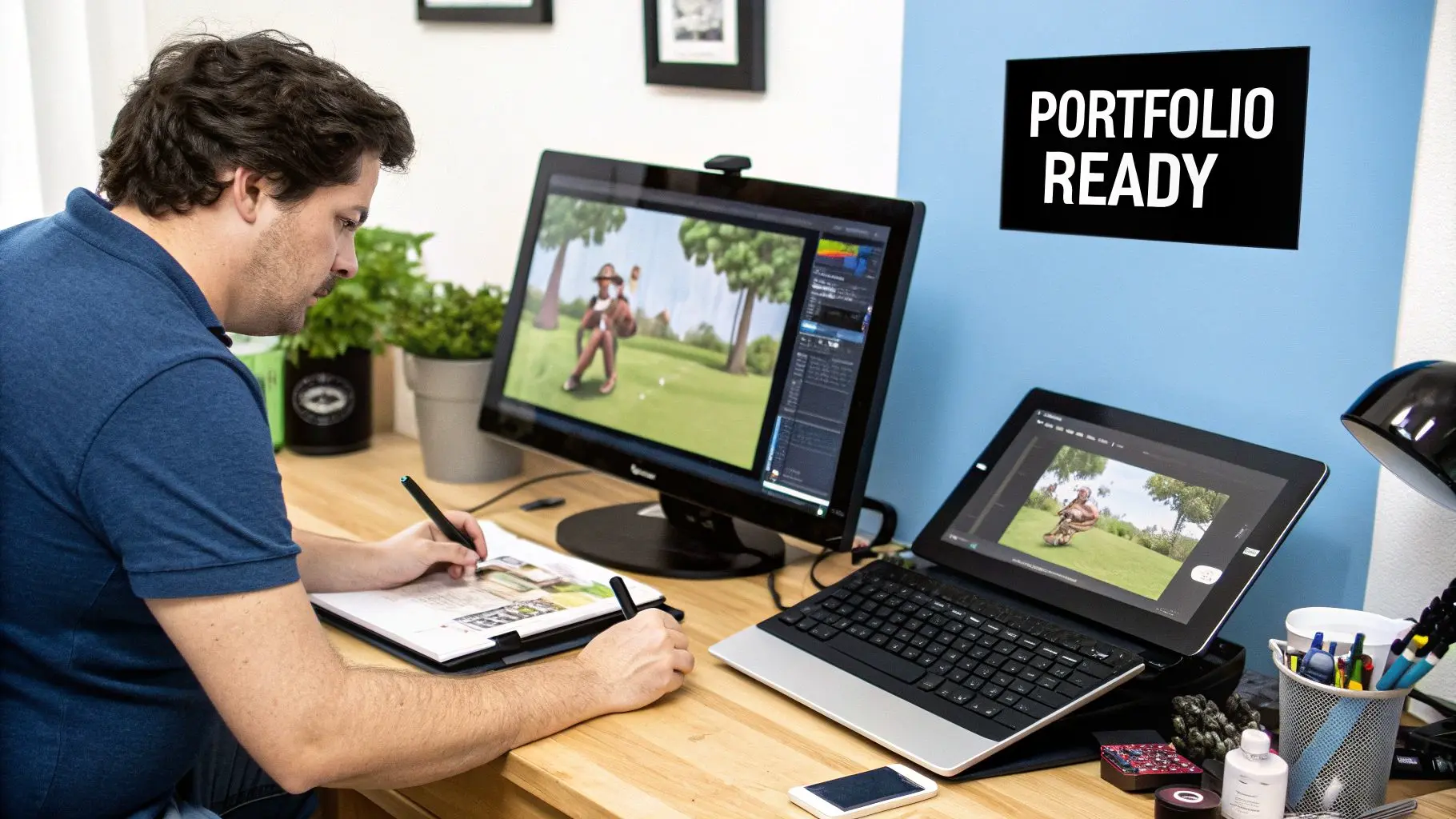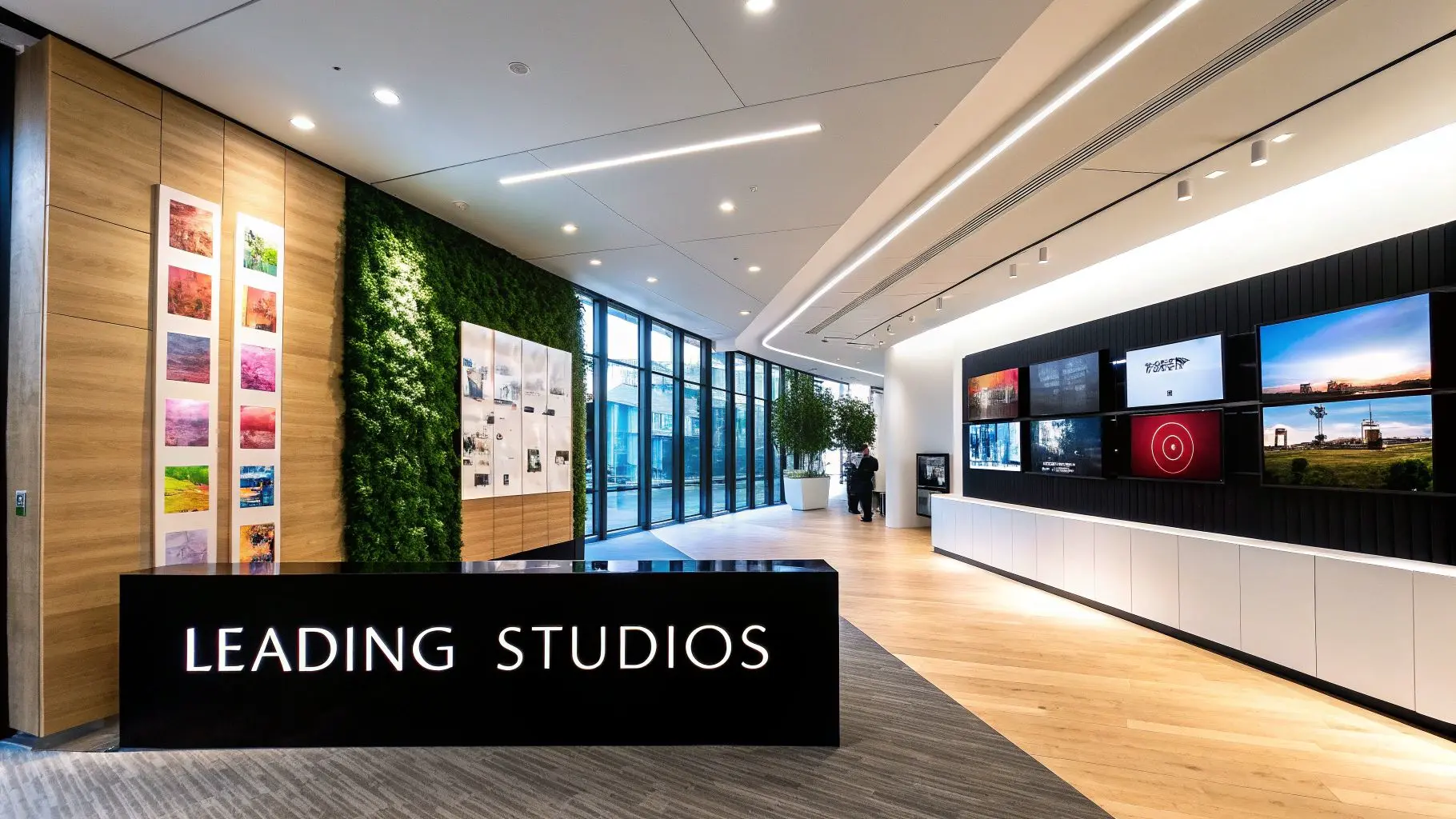The Ultimate Guide to Landing Animation Internships in the UK
Landing an animation internship in the UK is a crucial first step in building a successful career. It's your opportunity to gain hands-on experience, learn from seasoned professionals, and make invaluable connections in one of the world's most dynamic creative industries. From year-long paid placements at major broadcast studios to shorter, project-based roles at nimble boutique agencies, an internship is the bridge between your formal education and a full-time professional role.
Understanding the UK Animation Internship Landscape
The UK animation industry is a thriving ecosystem, with major hubs in London, Manchester, and Bristol. However, not all entry-level positions are the same. It's essential to understand the distinction between internships, apprenticeships, and trainee schemes to identify the best fit for your career goals. An internship typically offers project-based experience within a studio, while an apprenticeship integrates work with structured, formal training. Studios aren't just looking for raw artistic talent. They are seeking collaborative team players who are eager to learn the production pipeline and demonstrate a genuine passion for the craft. Your ability to integrate into a team, communicate effectively, and maintain a positive attitude is just as critical as your showreel.
Types of Opportunities Available
Internships vary significantly in scope and structure. Major players like Disney UK offer highly sought-after 12-month paid internships in London, with a competitive annual salary of around £28,000. These programmes provide a fantastic opportunity to gain a solid foothold in the industry, offering direct involvement in high-profile projects and extensive networking opportunities. Conversely, smaller independent studios often provide a more intimate, hands-on experience. While they may not have formal, year-round programmes, they frequently hire interns for specific productions. These roles are invaluable for gaining broad exposure to multiple stages of the animation services pipeline, from concept to final delivery.
The Growth of UK Animation Internships
The demand for fresh talent in UK animation has been on a consistent upward trajectory. This chart illustrates the growth in available internship positions over the past three years, reflecting a healthy and expanding industry.

This steady trend is a clear indicator of a robust industry, with more opportunities opening up for emerging animators than ever before.
The most valuable interns are those unafraid to ask questions. A willingness to learn and adapt is far more important than knowing everything on day one. It demonstrates engagement and a readiness to grow with the team.
Building a Portfolio That Gets You Hired
Your portfolio is the single most important asset in your search for an animation internship. It is your primary tool for cutting through the noise and capturing a recruiter's attention. Recruiters are inundated with applications; they are not looking for just any animation, but for specific evidence that you possess the skills, creativity, and potential to contribute to their studio's workflow. Your showreel must be a concise, powerful showcase of your abilities. The primary goal is to make a recruiter’s job as easy as possible. They need to identify your specialism, whether it's 2D character performance, 3D VFX, or motion graphics, within the first few seconds. Crucially, your work must align with the type of projects the studio produces. Research is non-negotiable.
What to Include in Your Showreel
A strong portfolio is a curated exhibition, not a collection of every piece you've ever animated. Quality always trumps quantity. Every frame must justify its inclusion, and you must lead with your most compelling work. Here is a practical breakdown of what to include:
- •A Powerful Opening: You have approximately five seconds to make an impression. Start with your most polished, technically impressive piece of animation to immediately hook the viewer.
- •Specialised Content: If you are a character animator, your reel should be filled with compelling character performances. If rigging is your passion, showcase complex, intuitive rigs in action. Tailor your content to the specific roles you are targeting.
- •Life Drawing & Observational Sketches: Including fundamental art skills demonstrates a solid understanding of anatomy, weight, and form, the bedrock of believable animation.
- •Personal Projects: This is where your unique voice and passion can shine. Independent projects show recruiters that you are dedicated to your craft beyond academic requirements.
Presentation and Your Online Presence
The presentation of your work is as critical as the work itself. Your showreel should be short, impactful, and professionally presented. The industry standard is to keep it under 90 seconds. Recruiters are time-poor; a lengthy, unfocused reel will likely be skipped.
Your portfolio is the ultimate proof of your skill and potential. It’s what gets you noticed, often completely overshadowing your formal qualifications. A polished showreel tells a studio you’re ready to contribute.
Your online presence must be professional and consistent. Your portfolio website, LinkedIn profile, and showreel should all present a cohesive brand, clearly communicating who you are as an artist.

For inspiration and a benchmark for quality, explore professional design and motion work. Leading UK programmes, such as the ScreenSkills Animation Trainee Finder, often prioritise portfolios over formal degrees. They focus on identifying raw talent and passion, helping emerging artists secure paid placements. The fact that a university degree is not always a prerequisite underscores the critical importance of your portfolio in securing the best animation internships UK has to offer.
Where to Find the Best Animation Internships
Knowing where to search is half the battle. When seeking the perfect UK animation internship, you must look beyond mainstream job sites. While platforms like Indeed and LinkedIn are useful, the most valuable opportunities are often found on industry-specific job boards and community hubs. For any aspiring animator, websites such as Skwigly and 3dtotal should be regular destinations. These platforms offer more than just job listings; they provide industry news, interviews, and resources that give you a genuine insight into the UK animation scene. Setting up targeted job alerts is a crucial first step.
Tapping into the Industry Network
Securing a role is as much about who you know as what you know. The UK animation community is surprisingly close-knit, and building connections can open doors that a cold application cannot.
- •LinkedIn is Your Professional Hub: Follow the studios you admire, connect with their recruiters, and engage with posts from industry professionals. A well-maintained profile serves as a dynamic CV and demonstrates your commitment to the community.
- •Industry Events are Invaluable: Attending events like the Manchester Animation Festival or the VFX Festival places you in the same room as hiring managers. This is your chance to make a personal impression that a digital application cannot replicate.
These events are vital components of the UK's talent pipeline. Animation UK works with industry bodies, using funds from the Animation Levy to ensure studios are present at numerous careers fairs annually. This creates direct communication channels between students and studios, making it a prime environment for discovering your next opportunity.
Research and Timing Your Application
Finding a listing is one thing; finding the right fit is another. Thoroughly research the studios you are targeting. Review their past projects. Do they specialise in 2D or 3D? Take a moment to delve deeper into the differences between 2D vs 3D animation to determine which discipline aligns with your skills and interests. Most importantly, does their creative style resonate with your own? A tailored application that demonstrates a genuine understanding and appreciation of their work will always stand out.
Don't just focus on the big-name studios. Smaller, boutique studios often receive far fewer applications and might be more willing to create an internship for a promising candidate who shows a real passion for their specific style of work.
Crafting an Application They Can’t Ignore

While a stellar portfolio gets your foot in the door, a thoughtfully crafted application walks you through it. Recruiters can easily spot a generic, copy-pasted application, and it's the quickest route to the rejection pile. Your CV and cover letter are your opportunity to connect with the hiring manager on a personal level. They tell the story your showreel cannot, showcasing your personality, your genuine passion for that specific studio's work, and a clear understanding of how you would fit into their team. Vague flattery is ineffective; you must be specific.
Nailing the Cover Letter
Your cover letter is your direct pitch. It must be concise, enthusiastic, and focused on them as much as it is on you. Avoid formal, generic templates and aim for a genuine connection. Here’s a simple structure:
- •The Hook: Begin by mentioning a specific project of theirs you admire. Explain why it resonates with you. Was it the nuanced character performance, the bold art direction, or the clever storytelling? This immediately demonstrates you've done your research.
- •The Bridge: Draw a clear line connecting their work to your own skills. For example: "The fluid character animation in your recent advert for X brand was inspiring, and I’ve been focusing on developing similar expressive timing in my personal project, [Project Name]."
- •The Vibe: Let your personality and excitement for animation shine through. Studios are hiring people who will be a positive, creative force within their culture.
"Your colleagues down the pipeline will really appreciate it too! We have each other’s backs when it comes to finding work... you come to know or hear of almost everyone, and these relationships are so important."
This insight is crucial. Studios are hiring future colleagues. They want to see someone who understands the collaborative, tight-knit nature of the animation world.
Making Your CV Work for You
Your CV should be a clean, easily scannable summary of your experience and skills. The key is to translate your project work into tangible skills and examples of problem-solving. Instead of simply listing software, briefly describe how you used it to achieve a specific outcome. Finally, a note on following up: it is perfectly acceptable to send a polite, brief email one to two weeks after applying. This shows proactivity and continued interest. Keep it professional and concise to avoid being pushy. This considered approach is vital for securing one of the top animation internships UK studios have to offer.
Ace Your Interview and Excel in Your Role
Congratulations, you've landed the interview! Now the real preparation begins. Studios are not just evaluating your technical skills; they are assessing your cultural fit. You must be prepared to discuss your work with passion and clarity. Expect a mix of technical and creative questions. They will want to know about your software proficiency and your understanding of a production pipeline, but they will also be interested in your creative process. Be ready to explain your methodology for a specific shot in your showreel, what were the challenges, and how did you overcome them?
Presenting Your Work with Confidence
When discussing your portfolio, go beyond narrating what is visible on screen. Tell the story behind the work. What was the brief? What specific creative decisions did you make? This demonstrates that you are a thoughtful artist, not just a software operator. Confidence is also conveyed through the questions you ask them. Prepare intelligent questions that show you have researched the studio and their projects. Inquiring about their production workflow or the collaborative process on a recent film shows genuine interest and initiative.
Becoming an Indispensable Team Member
Once you secure one of the best animation internships UK studios offer, your next goal is to become invaluable. The initial weeks are about listening, learning, and absorbing everything. Be proactive, but always be respectful of senior artists' time. Here are a few ways to stand out for the right reasons:
- •Actively Seek Feedback: Don't wait for a review. Regularly ask for feedback and, crucially, demonstrate that you are acting on it. This proves you are coachable and committed to improvement.
- •Embrace Every Task: You may be assigned smaller, less glamorous jobs. Perform them with a positive attitude. A can-do spirit is infectious and gets noticed. It shows you're a true team player.
- •Network Internally: The UK animation industry is a small world. Make an effort to connect with people in other departments. These relationships can lead to future opportunities.
The interns who really make an impression aren't afraid to ask for opportunities to test their skills in new areas. Even if the answer is no, it shows initiative and a desire to grow, and that’s exactly what studios look for when they're thinking about future full-time hires.
Ultimately, the goal is to convert your internship into a full-time position. By being reliable, eager to learn, and a positive presence in the studio, you make it an easy decision for them to want to keep you on the team.
Frequently Asked Questions

Navigating the world of animation internships in the UK can feel overwhelming. We've compiled clear, straightforward answers to the most common questions from aspiring animators.
Do I Need a University Degree for a UK Animation Internship?
Not necessarily. While many interns have a university background, UK studios are far more interested in your portfolio and showreel than your formal qualifications. Schemes like the ScreenSkills Animation Trainee Finder explicitly state that a degree is not a requirement. Your skill, creativity, and demonstrated passion for the craft are what open doors. A strong showreel is always more persuasive than a diploma.
Are Animation Internships in the UK Paid?
Yes. Any legitimate, structured animation internship in the UK must be paid. Industry bodies like Animation UK and the BECTU union are strong advocates for fair pay for junior talent.
It is illegal for a company to have an intern performing the work of a regular employee without paying them at least the National Minimum Wage. Many major studio programmes offer competitive salaries well above this minimum.
If you encounter an unpaid role that requires you to contribute valuable production work, consider it a major red flag. Always ensure you are fairly compensated for your time and skill.
What Software Skills Are Most in Demand?
The required software depends on your specialism, but several key applications consistently appear on UK studio wish lists.
- •For 2D Animation: Proficiency in Toon Boom Harmony and the Adobe Creative Suite (especially After Effects and Animate) is highly valued.
- •For 3D Animation: Autodesk Maya remains the industry standard. However, skills in Blender and real-time engines like Unreal Engine are becoming increasingly sought-after assets.
- •For Specialised Roles: For artists focusing on sculpting or texturing, expertise in ZBrush and Substance Painter provides a significant competitive advantage.
When Is the Best Time to Apply for Internships?
Timing your application strategically can increase your chances of success. Many larger studios with formal programmes begin their recruitment in the autumn for internships starting the following summer. However, opportunities can arise throughout the year, especially at smaller studios that hire based on project needs. The best strategy is to begin your search 6-9 months before your desired start date and continuously monitor industry job boards to stay informed of new openings. Ready to bring your creative vision to life? At Studio Liddell, we've been producing award-winning animation and immersive experiences since 1996. Explore our work and see what we can create together.